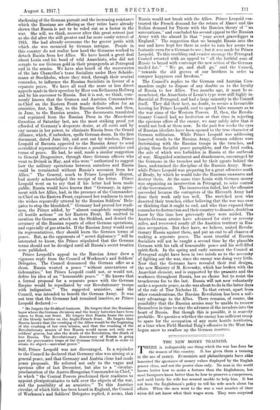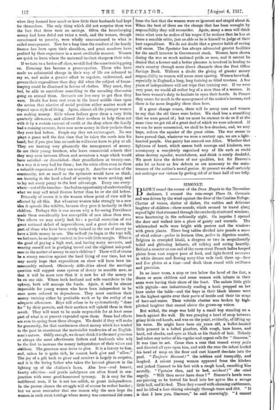THE NEW MONEY TRAINING.
FillIERE is indisputably one thing which the war has done for the women of this country. It has given them a training
in the use of money. Economists and philanthropists have alike
lamented the ignorance of money values displayed by the English poorer class, and not the poorer class only. No man in the world knows hotter how to make a fortune than the Englishman, but most foreigners know better than he how to preserve a competence. and until lately his wife has seemed unable to help him. It has not been the Englishman's policy to tell his wife much about his all airs. When the men went to the war a vast number of their wives did not know what their wages were. They were surprised
when they learned bow moth or how little their husbands had kept for themselves. The only thing which did not surprise them 'was the fact that there were no savings. Often the housekeeping money had been doled out twice a week, and the women, though accustomed to poverty, were wholly unaccustomed to what is called management. Now for a long time the conduct of the family finance bas been upon their shoulders, and groat numbers have profited by their experience in a most creditable manner. Women are quick to learn where the maternal instinct sharpens their wits.
If we turn to a better-off claes, we still find the same training going on. Economy has become a preoccupation. Those who have made no substantial change in their way of life are ashamed to say so, and make a greater effort to regulate, understand, and govern their expenditure than they did when the subject of house- keeping could be dismissed in favour of clothes. They must, they feel, be able to contribute something to the unending discussion going on around them. Servants are less easy to get than they were. Doubt has been cast even in the lower middle class upon the notion that niceties of social position either matter much or depend upon style of living. Again, almost all the younger women are making money. Girls whose fathers gave them a very little quarterly allowance, and allowed their mothers to help them out with it by a certain amount of credit at the shop where the family had a reaming account, bare now more money in their pockets than they ever had before. People say they are extravagant. No one plays a game well the first time that he takes the cards into his hand, but if you give him no cards he willnever learn to play at all. They are learning very pleasantly the management of money. So are their young brothers, who leave commercial schools that they may earn between fifteen and seventeen a wage which would have satisfied—or dissatisfied—their grandfathers at twenty-one. In a way it is very bad for them ; but the crisis offers even to them a valuable experience if they can accept it. Another section of the community, not so small as the optimists would hare us think, me learning in the hard school of scarcity to waste nothing, and to lay out every penny to the best advantage. Every one every- where--out of tbe trenches—has had an opportunity of understanding what we may call retail finance better than he or she did before.
Primarily of course it is the women whose point of 'dew will be affected by all this. But whenever women take strongly to a new idea it spreads like wildfire, because they pass it instantly to their children. Perhaps this is one reason why a far-seeing Providence made them considerably less susceptible of new ideas than men. Two effects we may surely look for : a partial correction of our great national defect of improvidence, and a great desire on the part of those who have been newly trained to the use of money to have a little money to use. The well-off (to begin at the top) will, we feel sure, be no longer content to live with little margin. What is the good of paying a high rent, and having many servants, and wearing oneself out in grudging travel and the slightest independ- ewe in the matter of money to one's children ? There will of course be a strong reaction against the haul living of war time, but we may surely hope that expenditure on show will have been int- measurably reduced. Obviously difficulties about the marriage question will suggest some system of dowry to sensible men, so that it will be more ram than it is now for all the money to be on one eicle. Where both husband and wife contribute to the upkeep, both will manage the funds. Again, it will be almost impossible for young women who have been independent to be once more reduced to dependence. They must continue their money training either by profitable work or by the outlay of an adequate allowance. Boys will- refuse to be systematically "done for" by their parents, and their mothers will uphold them in their revolt. They will want to be made responsible for at least some part of what is at present expended upon them. Some bad effects are sure to spring from these changes. We doubt if they will make for generosity, for that carelessness about money which has tended in the past to counteract the materialist tendencies of an English- man's nature. Oddly enough, we do not think it is the most generous or always the most affectionate fathers and husbands who will be the first to increase the money independence of their wives and ehildrem The generous man loves to give. It is a luxury to him, and, unless he is quite rich, he cannot both give and "allow." The joy of a gift both to giver and receiver is largely in surprise, and it is the loving father who takes the keenest pleasure in the lightir.g up of the children's faces. Also love—real honest, hearty affection—and gentle indulgence are often found in con- junction with some good-humoured tyranny. It is easy for the indifferent man, if he is not too selfish, to grant independence. In the poorer classes the struggle will of canine be rather harder ; but we must remember that one reason why the men kept the women in such stern tutelage where money was concerned did come from the fact that the women were so ignorant and stupid about it When the best of them see the change that has been wrought by responsibility they will reconsider. Again, many a man will think twice what uses he makes of his wages if he realizes that he has at home a sensible critic, just as able as he is himself to judge of their best expenditure. We do not doubt that a greater habit of saving will ensue. The Spectator has always advocated greater facilities for the small investor in Government stock. Women have shown during the war as much national pride as men, and it cannot be denied that a keener and a better pleasure is involved in lending to one's country through more direct channels than the Poet Office Savings Bank. Without a doubt the giving of greater money responsibility to women will mean more sparing. Women have bad, especially in England, a long, long training as blind trustees. A few years of independence will not wipe that training out. If wo were very poor, we would all rather beg of a man than of a woman. It has been women's duty to hesitate to open their hands. In France they count for much in the management of the nation's income, and there is far more frugality there than here.
If a great change comes, there will be man ye men and women to say that the old times were better. We shall lose a something that we were proud of ; but we must be content to do so if at the same time we get rid of a great deal of which we were ashamed, if we can be more economical, we shall be less drunken, and, we may hope, reduce the squalor of the great cities. The war seems to have proved that, whatever we were a century ago, we axe a. light- hearted people. Oer gaiety has amazed our Allies. Whether that lightness of heart, which means both courage and kindnees, can accompany a completely organized way of life such as could alone destroy squalor, wastefulness, and drink is surely doubtful. We must have the defects of our qualities, but for Heaven's sake let us have as few defects as are necessary to the main- tenance of the nation's moral genius. At present we shall certainly not endanger our virtues by getting rid of at least half of our folly.



























 Previous page
Previous page